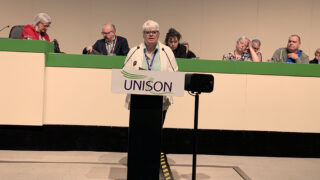UNISON’s 2022 women’s conference ended today with a series of debates following an address to delegates by general secretary Christina McAnea.
Moving a key motion on sexual harassment for the national women’s committee, joint vice chair Deborah Yapicioz said that UNISON welcomed last summer’s announcement by the UK government that it would introduce a new duty on employers to protect all staff from sexual harassment at work, along with protections for workers harassed by clients or customers as well as colleagues.
However, that was in July and as of the second half of February there is no sign of progress.
“Sexual harassment can have a devastating impact … affecting work performance and personal health,” she said. “Half of all women have been victims of sexual harassment in the workplace. Yet four out of five don’t feel able to report it to their employment.
“It’s against the law, but it’s clear that the law isn’t working.”
And Ms Yapicioz called on delegates to “build the campaign for zero tolerance” toward sexual harassment.
Conference called on the committee to work with the national executive council and other parts of the union to:
- continue to press the government to introduce what it committed to;
- continue to campaign for zero tolerance to sexual harassment in workplaces, including online;
- refresh and update the union’s own guidance on the issue.
Up next – and introduced by Ann Cherry for the national committee – was a motion calling for the laws on stalking to be strengthened in the workplace.
“Stalking is a behaviour that is designed to intimidate … an unwilling person,” pointed out Ms Cherry. And it “can escalate” to assault, rape or even murder.
Affecting all sorts of people, it is “a form of assault” and “can happen in the workplace,” she continued, adding that “cyber stalking has increased massively during lockdowns”.
After a passionate debate, delegates backed a motion from the national LGBT+ committee, moved by Jackie Lewis, to “end support for the ’Nordic’ model” that criminalises anyone who purchases sexual services.
Whatever its intentions, that model increases the safety risks to sex workers, while there is no evidence that it reduces consensual sex work, she explained.
For the national Black members’ committee, Mitsy Harmon Russell, highlighted the additional problems that Black women can find in “having our symptoms taken seriously” when experiencing the menopause.
Some studies have suggested that some menopause symptoms could be worse for Black women than for women of other ethnicities.
Linda Woods from the West Midlands regional women’s committee reminded delegates of the struggles to access abortion services before the 1968 Abortion Act was passed.
And conference supported her call for the union to continue to campaign for buffer zones around clinics where women seek pregnancy advice and terminations, in order to protect both those women, and clinic workers.
In the following motion, Maddy Cooper from Camden stressed the attacks on the right to choose, saying that the “near total ban on abortion in Texas is devastating” and calling for vigilance in the UK on the issue.
Maggs Abbott from the North West region told delegates that “direct discrimination against single parents is not illegal”, as she called for being a single parent to be added to the Equality Act 2010 as a protected characteristic.
In a motion from the LGBT+ committee, Eileen Best noted that anti-trans rhetoric in Britain has ramped up in recent years.
“We must stand with them [our trans colleagues] against this,” adding that there is a stream of ‘fake news’ about trans women in particular, and that it is also clear that money supporting anti-trans campaigns is coming from the far right.
The final motion of conference saw Janet Green from South Tyneside local government branch tell delegates that is 36 years since CEDAW – the UN Convention on the Elimination of all Discrimination against Women (sometimes called the International Bill of Rights for Women) – was ratified in the UK, “but discrimination continues.”
In 2019, an international report concluded that the UK was “still not compliant” with the convention.
Rue Chifugo on behalf of the national women’s committee said that CEDAW “sounds very dry … but it’s so important … helping millions of women around the world, bringing about changes in their daily lives”.
Conference instructed the national women’s committee to work with the NEC and the Labour Link to develop a comprehensive campaign on the implementation of CEDAW into domestic law.




